- Home
- Chris Pierson
Divine Hammer k-2
Divine Hammer k-2 Read online
Divine Hammer
( Kingpriest - 2 )
Chris Pierson
Chris Pierson
Divine Hammer
PROLOGUE
Tenthmonth, 935 I.A.
The folk of Krynn thought it was a moonless night. Silver Solinari, a slender crescent at this time of the month, set soon after sunset, and Lunitari, the red moon, would not rise until dawn. In their absence, the sky-clear this cool autumn eve, unmarred by clouds-seemed empty of all but stars.
It was not.
Most folk could not see the third moon. Unlike its bright sisters, Nuitari was black as a dragon’s heart, blending with the night. Only a few-astronomers and madmen, mostly-marked it as a hole in the sky, tracing it by the stars it blocked as it passed. Others, however, could see every crater and scar, even-though it reflected none of the sun’s light-its phase, and thus gauge its power.
A thousand years ago, dragons, monsters, and dark-hearted men had all but ruled the world, and Nuitari had shimmered with their power. That was the past, though. The dragons were gone, banished from the world, and the followers of the gods of light had hunted down those who served the shadows, beast and man alike. In all the world’s realms-crumbling Ergoth, proud Solamnia, wild Kharolis, the kingdoms of elves, dwarves, and kender-the disciples of evil were few, scattered, forced to hide if they wanted to survive.
The place of faintest shadows was the Holy Empire of Istar. The Kingpriest who ruled the empire, a man folk called Lightbringer, had commanded his people to destroy all evil in the name of the god Paladine. For more than a decade, pyres had burned beneath stakes, gibbets had groaned and creaked, and blood had caked thick on headsmen’s blocks and warriors’ swords.
Still, despite the purges, vestiges of darkness survived.
Monsters still skulked in the wildlands, and cults of evil gods worshiped in secret haunts. There were those who could not only see the black moon but could draw down its power to spin into sorcery. The Kingpriest detested these dark wizards, and so the mages who wore the Black Robes seldom ventured out into the open.
The black moon was strong tonight, not just full but close, large in the sky. Its power crackled in the crisp air, so charged that children the world over squirmed as they slept, in the throes of formless nightmares. In this night, dark sorcerers walked out in the open.
Andras crouched in the darkness, his breath coming short and quick. He was a tall man, slender and golden-haired, the sort who might have made maidens swoon had he wielded a blade or played the lute. No maidens pined for those whose tools were the staff and the scroll, though-or for those whose faces were half burnt away. The strange tightness of Andras’s ravaged flesh was a constant reminder of the sacrifices he had made to become a mage. The Test, which every wizard had to undergo in order to join the Order of High Sorcery, often left its mark. Barely a year ago, it had left the left side of his face ridged and glistening with scars as a warning against vanity. The warning had worked: not even the enchantresses who served Nuitari could look at him without wincing, so he had devoted himself all the more to the magic and his dark god.
“Boy,” rasped a voice in the gloom, “Get your head about you.”
Andras started out of his reverie, glancing to his left. Stooped beside him, small and bony beneath his ebon robes, was his master. Nusendran the Voiceless-the Test had ravaged his throat so badly he could only speak in a dry growl-was a powerful Black Robe and would one day serve on the Conclave that governed the High Sorcerers. His gray-bearded face was pinched with annoyance.
“It’s time,” Nusendran said. “Cast the spell as I taught you.”
A smile crept across Andras’s disfigured face. He had been waiting for this moment for half his twenty-four years, ever since his first lesson in magecraft. Until today; he had cast only minor spells, under his master’s supervision. Tonight, though, he would finally wield true magic. He felt the black moon’s power bathing him, hot and strong.
Eye of Night, he prayed, watch over me.
As his master watched, he delved into a small pouch at his belt and produced a wad of Yerasan gum. Rolling it into a ball, he reached up with his other hand and plucked out one of his eyelashes. He stuck this into the gum, tears running down his cheek, then squeezed it in his left hand. With his right he wove a complicated gesture through the air, fingers dancing as he chanted soft, spidery words.
“Ristak pur koivannon, sha pangit felori.”
The feel of magic recalled the bliss of loveplay, lost to him since the Test. His body went rigid, his nostrils flaring as the magic surged through him. A quiet groan slipped from his lips. The air around him shuddered, as it might on a summer’s day-then stilled again-and Andras vanished.
Nusendran hardly ever smiled, but now a proud grin split his wispy beard. “Well done, lad,” he said. “Keep it up, and one day you’ll make your mark on the world.”
He cast the invisibility spell as well, barely blinking as he plucked his eyelash, and spoke the incantation in half the time it had taken Andras. Then he was gone as well.
“Now,” Nusendran rasped, “let’s go.”
Together, they crept out of the shadows, beneath the black moon’s gaze.
The farm was like any in Ismin, the breadbasket of Istar. The family who owned it were wealthy landholders, overseeing several hundred workers who tended fields of barley and wheat, herds of cattle, and scattered orchards, olive groves, and vineyards. The villa, a sprawling, whitewashed building with a red-tiled root, perched on a ridge overlooking the farmers’ thatched cottages. A simple shrine of Paladine, surmounted by the god’s silver triangle, stood watch on the village’s other side. It was wearing on midnight, and the farmers were asleep, the rich folk above finishing their evening meal and perhaps listening to a wandering poet’s latest epic or playing at khas in their parlor.
Two guards stood watch at the hamlet’s edge, rough men who held their spears awkwardly, more accustomed to the feel of a flail or scythe. They muttered together in hushed voices, and one laughed, lifting a jug of wine. He drank deeply, then passed it to the other.
The two wizards stood ten paces from them, cloaked by magic. Andras had worried there might be dogs to pick up their scent, but the only one around was an old bitch asleep beneath a wagon. He looked a question at his master, whose eyes glittered.
“I’ll take the one on the right,” whispered Nusendran. “The other is yours. Be swift.”
Andras nodded, a dark, sweet thrill running through him. He hadn’t expected he would have the chance to kill with sorcery tonight. Swallowing, he looked back to the guards, and began to gesture, pointing. “Obrut ku movani, yatho viskos daldannu. ”
The man on the left was still drinking when the spell took hold, and so, when the wine sprayed from his mouth and the jug crashed to the ground, his fellow started to pound him on his back, sure he was choking. Andras smiled, reaching out with magic to squeeze out the man’s breath. He clenched his fist, and the guard collapsed, eyes bulging, clutching at his collar. The other man gaped as, with a last, twitching kick, the guard fell limp.
Nusendran grunted approvingly, then spoke, and all at once the darkness around the second guard began to writhe. In a heartbeat it coalesced into a black serpent, with eyes of jet and a mouth of obsidian fangs. The guard stared, his mouth opening to scream. In a flash, the shadow-snake struck, ripping out the guard’s throat. A fan of blood shot through the air as he collapsed.
Nusendran sent the serpent to kill the sleeping bitch as well, just in case. Then the shadowy monster shivered and dissolved back into the night. The two mages held still a moment longer, watching and listening. All was silent.
They met no one else as they crept around the village, finally drawing up before a s
mall pasture to the south, surrounded by a low, stone fence. Within, the pen was filled with small, woolly shapes: yearling lambs, all of them asleep. Andras glanced up at Nuitari: the dark moon was near its zenith now, fat as a summer plum. Nearly time.
Several lambs stirred as he and Nusendran hoisted themselves over the fence and dropped down into the pen, but none of them woke, and after holding still a moment, the two mages moved again. They split up, carefully stepping over the sleeping animals, eyes darting this way and that. Andras bit his lip as he went, feeling the black moon’s weight upon him.
“Boy! Over here!”
The whisper cut through the night, making Andras jump. He glanced across the pen. An orange tree rustled by the fence. Smiling, he started toward it.
There, surrounded by a sea of white fleece, was a single animal that was as dark as his robes. Teeth bared, Andras threaded toward the black lamb. As he went, he pulled a small opal vial from his sleeve. Unstopping it, he crouched beside the animal and waited.
Black Robe wizards used certain magic the other orders wouldn’t touch: spells that could make moldering bodies rise again or cause a man such agony he would smash his own skull to escape the pain. Others treated with the foul spirits of the Abyss. Demons, however, didn’t aid mortals for free.Without the proper offering of appeasement, they would rip apart any sorcerer who dared disturb them. Nusendran had been preparing for months to make contact with such a fiend, but the spell demanded the lifeblood of a black lamb, stolen when Nuitari soared full in an empty sky. A night like tonight.
A soft word hissed, and Nusendran shimmered back into being. In his hand was a long knife of cold-forged iron. Andras ended his invisibility spell as well, holding out the vial.
“Hold it steady,” the elder mage said. “This will be over quick.”
Andras nodded. Nusendran bent low over the lamb, set the blade’s tip behind the animal’s ear, whispered a prayer to Nuitari, then drove the dagger home.
The lamb shuddered, kicking, but made no sound as it went limp. Nusendran jerked the blade free, then opened the veins in the animal’s throat, freeing a crimson torrent to soak the earth. Andras moved quickly; the warm blood poured into the vial and soaked his hands. He rose, replacing the cork with fingers that glistened red.
For the second time that night, Nusendran smiled. He wiped the knife on the dead lamb’s wool and sheathed it again.
“Good,” he said. “Now let’s go, before-”
Another voice rose, clear and loud and close. “Cie nieas supam torco, Palado,” it intoned, “mas bodoram burtud.”
Andras looked up, his breath catching. Like any lettered person in the empire, he knew the tongue of the Istaran church. Though I walk through night’s heart, Paladine, be thou my light.
A shaft of light, bright as the silver moon, lanced down upon the pasture. Nusendran and Andras froze as around them the lambs began to wake. The elder mage whirled, and Andras followed his master’s gaze, his lip curling. There, beneath a poplar tree, stood a man in a white cassock. In his hand, gleaming as it reflected the holy light, was a platinum medallion. A Revered Son, one of the servants of the Kingpriest of Istar.
The cleric wasn’t what made Andras’s eyes widen and his flesh crawl, though. Rather, it was the men flanking him: a dozen knights in mirror-bright armor and horned, visored helms. Half of them cradled loaded crossbows. The rest gripped swords. Emblazoned on their white shields and snowy tabards was an emblem that made hate surge in Andras’s heart: a golden hammer, limned with scarlet flames.
“Ten eyes of Takhisis,” he swore, staring. “Master-”
“Run!” Nusendran shouted, shoving him.
The lambs bleated madly as they fled. Behind, the knights shouted for them to halt.
Andras heard the click of crossbows. He shut his eyes, waiting for the pain of quarrels burying themselves in his flesh, but his master was quicker. Beside him, Nusendran twisted a garnet ring on his finger, and a sphere of golden light burst about them. The bolts struck the light as if it were a wall of stone and spun away, sparking. The knights’ shouts turned to curses, and Andras laughed.
Armor clattered after them as they vaulted the fence again. Andras stumbled over a tree root, nearly fell. Nusendran made no effort to help him. Righting himself, he ran on, catching up to his master as they reached the village’s edge.
Suddenly, there were more knights in front of them as well, swords bristling, Nusendran snarled a vile curse as he skidded to a halt. Andras staggered up beside him. His hood had blown back as he ran, as had his master’s, and his heart dropped when he saw how pale Nusendran was. Even the old man’s lips were the color of bleached bone. Andras had never seen his master afraid before. Now both men were terrified.
The knights clattered nearer, surrounding them. Snarling, Nusendran flung out his arm, and darts of violet light struck three of them with a thunderclap. The reek of burnt flesh filled the air as boneless bodies rattled to the ground. Nusendran wasted no time, dashing toward the gap in the knights’ ranks….
A quarrel hit him in the back, spinning him around. He fell, gasping and clutching at the bloody point sticking out of his breast. Andras stared, his jaw slack. Nusendran glared up at him, his teeth clenched.
“Do something, damn you,” the mage wheezed.
It was too late. Andras was winded, and the magic he’d wielded tonight had drained him. He had no strength to fight, nowhere to run. The knights closed in-
Something strange happened.
At first, Andras thought his eyes were playing him false, but after a moment he knew it wasn’t so. There was a cloud of silvery motes in the air, surrounding him, growing brighter with every breath he drew. The knights saw the cloud too and halted their advance, glancing warily at one another. Nusendran’s eyes went wide.
With a noise like shattering crystal, the motes flared sunbright. Andras saw his master’s shocked face, saw the knights fling up their shields to protect their eyes-then the light blinded him, and he saw no more.
Andras awoke in a bower of acorn-heavy oaks, propped against a gnarled, mossy stump.
It was dark, and the world swam before him as he struggled to sit up. He knuckled his eyes, trying to get them to work. What had happened to him? He could remember the knights, his master falling, the silver light … and now, this place. Where in the Abyss was he?
“Get up, lad. You’re just in time to watch.”
The voice was like none Andras had ever heard before. In his training as a Black Robe, he had met scores of dark-hearted mages, and more than a few priests of the evil gods. He had even listened while Nusendran communed with minor demons. None of them, however, had sounded so eerie, so cruel. It seemed the air actually filled, with frost at the sound.
Shivering, he twisted, looking for its source.
There were many tales of the man his brethren called the Dark One, the mightiest of all the Black Robes, but few were privileged to encounter him. Now, though, Andras found himself staring at a tall, broad-shouldered form whose plain black robes made him all but invisible in the bower’s gloom. His hands were age-spotted and almost skeletal, his face mercifully lost in his hood’s shadows. Only the tip of a long, gray beard emerged from that darkness. Magical power seemed to seethe about him, rippling the air.
“Fistandantilus,” Andras breathed.
The hooded head inclined. “You know me,” said the cold voice. “That will save time. Come, boy. You should see this, before it is done.”
With that, the archmage turned and strode away, into the shadows.
Andras hesitated, torn. His instincts screamed at him to flee: even the highest among the Black Robes feared Fistandantilus. But he knew, too, that the Dark One was not the sort of man from whom one escaped. It would only make the archmage angry if he fled, and tales of Fistandantilus in his wrath were the sort that robbed necromancers of sleep.
Shuddering, Andras rose and followed the robed figure into the night.
He emerged from the
oaks at the edge of a cliff, above a narrow ravine. In the distance, on another ridge, was the farm-villa, lights now blazing in all its windows. And below, near the creek that snaked through the ravine’s heart, were the knights.
There were thirty of them and three clerics whom he could see-the Revered Son of Paladine in his white vestments, a Mishakite healer in pale blue, and a war-priest of Kiri-Jolith in gold. They were all singing a hymn in the church tongue. He couldn’t quite make out the words. Many of the knights had doffed their helms and held the hilts of their swords to their lips as they stared past the clerics toward a bonfire that burned beside the stream.
It was a high blaze, flames snapping and popping ten feet tall, cinders billowing to soar away on the night wind. Andras frowned, wondering why the knights would build such a fire-but only for a moment. Then he saw the form amid the flames and knew.
Little remained of Nusendran but a charred husk hanging from manacles affixed to a stake. His hair and robes had burned away, his flesh peeled and bubbled as the fire caressed it. The wind was wrong for the stink to reach him, but Andras’s mind fooled him into smelling the stench of death anyway. Groaning, he bent forward and vomited over the cliffs edge. When that was done, he leaned against a tree, gasping.
Fistandantilus was right beside him, cold coming off him in waves. His voice held no sympathy whatsoever.
“Poor Nusendran, the old fool. He died cursing them, you know.”
Andras didn’t look at the archmage. Instead, he stared at the flames, his eyes shimmering with their light. He clenched his fists, fighting down his rage. If he didn’t, he knew, he would charge at the knights now. Perhaps he would be able kill one or two before they brought him down, but bring him down they would.
He took a deep breath. “I have to tell the Conclave.”
“The Conclave are useless,” Fistandantilus replied. “Do you think this is the first time this has happened? The White Robes and the Red Robes have heard this tale many times, and still they do nothing to help those who wear the Black.”

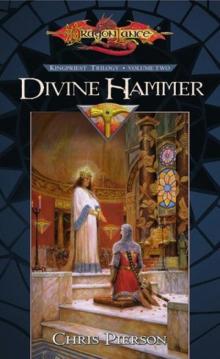 Divine Hammer
Divine Hammer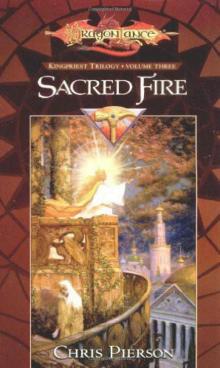 Sacred Fire
Sacred Fire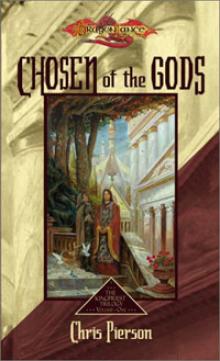 Chosen of the Gods k-1
Chosen of the Gods k-1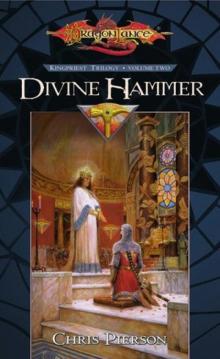 Divine Hammer k-2
Divine Hammer k-2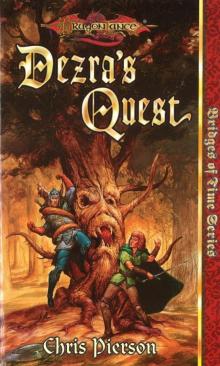 Dezra's Quest
Dezra's Quest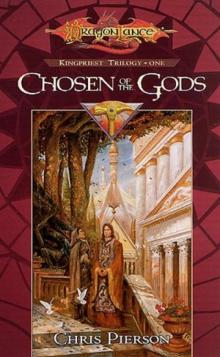 Chosen of the Gods
Chosen of the Gods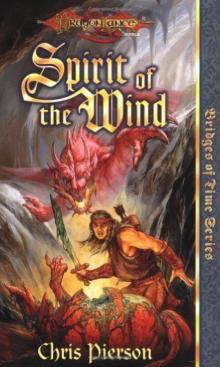 Spirit of the Wind bot-1
Spirit of the Wind bot-1